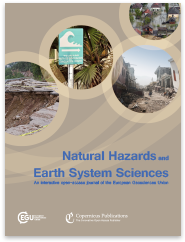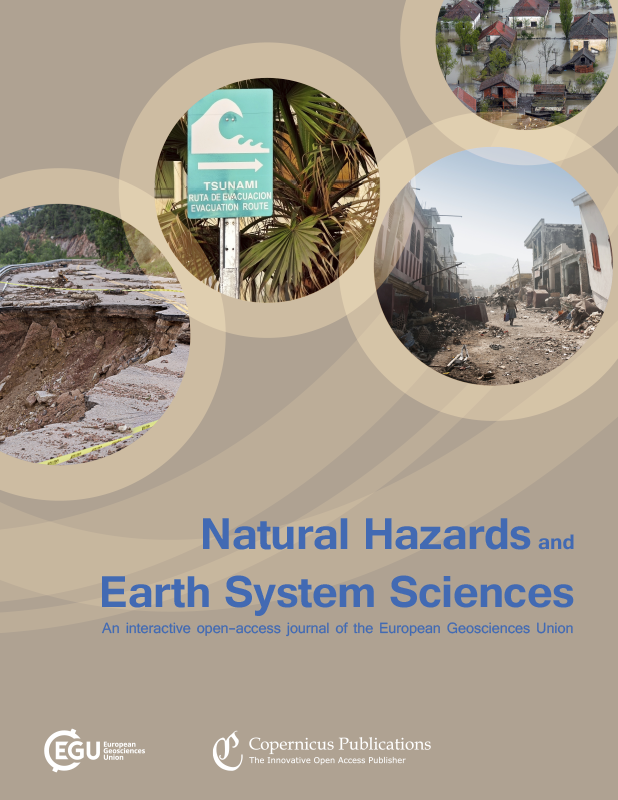Executive editors: Maria Ana Baptista, Animesh Gain, Gregor C. Leckebusch, Bruce D. Malamud, Paolo Tarolli & Uwe Ulbrich
eISSN: NHESS 1684-9981, NHESSD 2195-9269
Natural Hazards and Earth System Sciences (NHESS) is a not-for-profit interdisciplinary and international journal dedicated to the public discussion and open-access publication of high-quality studies and original research on natural hazards and their consequences. Embracing a holistic Earth system science approach, NHESS serves a wide and diverse community of research scientists, practitioners, and decision makers concerned with detection of natural hazards, monitoring and modelling, vulnerability and risk assessment, and the design and implementation of mitigation and adaptation strategies, including economical, societal, and educational aspects.
Journal metrics
NHESS is indexed in the Web of Science, Scopus, Google Scholar, etc. We refrain from displaying the journal metrics prominently on the landing page since citation metrics used in isolation do not describe importance, impact, or quality of a journal. However, these metrics can be found on the journal metrics page.
News
10 Feb 2025
Thank you to all our referees in 2024!
A big thank you to all referees for their volunteer work in providing fair, thorough, and constructive peer-review reports! Through their invaluable contribution our interactive open-access journals maintain their high scientific standards and their ongoing success. 
10 Feb 2025
Thank you to all our referees in 2024!
A big thank you to all referees for their volunteer work in providing fair, thorough, and constructive peer-review reports! Through their invaluable contribution our interactive open-access journals maintain their high scientific standards and their ongoing success. 
05 Feb 2025
Copernicus Publications and all journals left Twitter
The Copernicus Twitter account as well as all Twitter accounts of journals published by us have been deactivated. There will be no automatic feeds of newly posted preprints or published journal articles anymore, we do not actively tweet, and the status informs that the accounts are no longer maintained. Twitter is no longer linked from the journal websites or in the share section of the preprint or journal article HTML pages.
05 Feb 2025
Copernicus Publications and all journals left Twitter
The Copernicus Twitter account as well as all Twitter accounts of journals published by us have been deactivated. There will be no automatic feeds of newly posted preprints or published journal articles anymore, we do not actively tweet, and the status informs that the accounts are no longer maintained. Twitter is no longer linked from the journal websites or in the share section of the preprint or journal article HTML pages.
19 Dec 2024
ResearchGate and institutional agreements
We are pleased to announce that scientists associated with our 38 library partners representing 350 universities and research centres as well as 300 institutions from Research4Life countries will be informed directly about APC coverage when browsing our articles on ResearchGate. Read more. 
19 Dec 2024
ResearchGate and institutional agreements
We are pleased to announce that scientists associated with our 38 library partners representing 350 universities and research centres as well as 300 institutions from Research4Life countries will be informed directly about APC coverage when browsing our articles on ResearchGate. Read more. 
21 Feb 2025
Development of a regional probabilistic seismic hazard model for Central Asia
Valerio Poggi, Stefano Parolai, Natalya Silacheva, Anatoly Ischuk, Kanatbek Abdrakhmatov, Zainalobudin Kobuliev, Vakhitkhan Ismailov, Roman Ibragimov, Japar Karaev, Paola Ceresa, Marco Santulin, and Paolo Bazzurro
Nat. Hazards Earth Syst. Sci., 25, 817–842, https://doi.org/10.5194/nhess-25-817-2025,https://doi.org/10.5194/nhess-25-817-2025, 2025
Short summary
20 Feb 2025
Review article: A comprehensive review of compound flooding literature with a focus on coastal and estuarine regions
Joshua Green, Ivan D. Haigh, Niall Quinn, Jeff Neal, Thomas Wahl, Melissa Wood, Dirk Eilander, Marleen de Ruiter, Philip Ward, and Paula Camus
Nat. Hazards Earth Syst. Sci., 25, 747–816, https://doi.org/10.5194/nhess-25-747-2025,https://doi.org/10.5194/nhess-25-747-2025, 2025
Short summary
18 Feb 2025
Post-wildfire sediment source and transport modeling, empirical observations, and applied mitigation: an Arizona, USA, case study
Edward R. Schenk, Alex Wood, Allen Haden, Gabriel Baca, Jake Fleishman, and Joe Loverich
Nat. Hazards Earth Syst. Sci., 25, 727–745, https://doi.org/10.5194/nhess-25-727-2025,https://doi.org/10.5194/nhess-25-727-2025, 2025
Short summary
Highlight articles
24 Jan 2025
A methodology to compile multi-hazard interrelationships in a data-scarce setting: an application to the Kathmandu Valley, Nepal
Harriet E. Thompson, Joel C. Gill, Robert Šakić Trogrlić, Faith E. Taylor, and Bruce D. Malamud
Nat. Hazards Earth Syst. Sci., 25, 353–381, https://doi.org/10.5194/nhess-25-353-2025,https://doi.org/10.5194/nhess-25-353-2025, 2025
Short summary
20 Jan 2025
Spatial identification of regions exposed to multi-hazards at the pan-European level
Tiberiu-Eugen Antofie, Stefano Luoni, Aloïs Tilloy, Andrea Sibilia, Sandro Salari, Gustav Eklund, Davide Rodomonti, Christos Bountzouklis, and Christina Corbane
Nat. Hazards Earth Syst. Sci., 25, 287–304, https://doi.org/10.5194/nhess-25-287-2025,https://doi.org/10.5194/nhess-25-287-2025, 2025
Short summary
20 Jan 2025
Impacts from cascading multi-hazards using hypergraphs: a case study from the 2015 Gorkha earthquake in Nepal
Alexandre Dunant, Tom R. Robinson, Alexander L. Densmore, Nick J. Rosser, Ragindra Man Rajbhandari, Mark Kincey, Sihan Li, Prem Raj Awasthi, Max Van Wyk de Vries, Ramesh Guragain, Erin Harvey, and Simon Dadson
Nat. Hazards Earth Syst. Sci., 25, 267–285, https://doi.org/10.5194/nhess-25-267-2025,https://doi.org/10.5194/nhess-25-267-2025, 2025
Short summary
More highlight articles  All EGU highlight articles
All EGU highlight articles 
Notice on the current situation in Ukraine
To show our support for Ukraine, all fees for papers from authors (first or corresponding authors) affiliated to Ukrainian institutions are automatically waived, regardless if these papers are co-authored by scientists affiliated to Russian and/or Belarusian institutions. The only exception will be if the corresponding author or first contact (contractual partner of Copernicus) are from a Russian and/or Belarusian institution, in that case the APCs are not waived.
In accordance with current European restrictions, Copernicus Publications does not step into business relations with and issue APC-invoices (articles processing charges) to Russian and Belarusian institutions. The peer-review process and scientific exchange of our journals including preprint posting is not affected. However, these restrictions require that the first contact (contractual partner of Copernicus) has an affiliation and invoice address outside Russia or Belarus.





